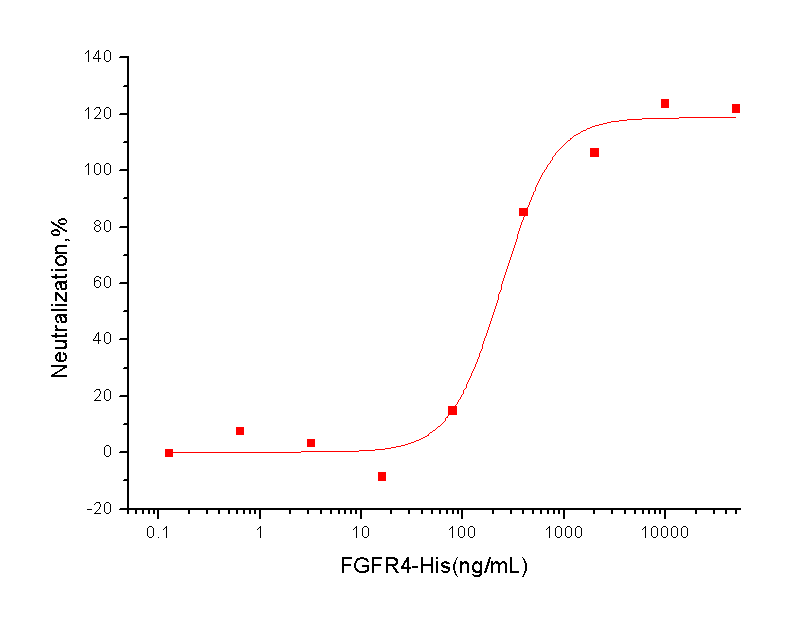Shopping Cart
- Remove All
 Your shopping cart is currently empty
Your shopping cart is currently empty

FGFR4 Protein, Human, Recombinant (His) is expressed in HEK293 mammalian cells with His tag. The predicted molecular weight is 40 kDa and the accession number is P22455-1.

| Pack Size | Price | Availability | Quantity |
|---|---|---|---|
| 50 μg | $255 | In Stock | |
| 100 μg | $417 | 7-10 days | |
| 200 μg | $682 | 7-10 days | |
| 500 μg | $1,300 | 7-10 days |
| Biological Activity | Measured by its ability to inhibit FGF acidic (aFGF / FGF1) dependent proliferation of Balb/c3T3 mouse embryonic fibroblasts. The ED50 for this effect is typically 0.2-1μg/mL.  |
| Description | FGFR4 Protein, Human, Recombinant (His) is expressed in HEK293 mammalian cells with His tag. The predicted molecular weight is 40 kDa and the accession number is P22455-1. |
| Species | Human |
| Expression System | HEK293 Cells |
| Tag | C-His |
| Accession Number | P22455-1 |
| Synonyms | TKF,JTK2,fibroblast growth factor receptor 4,CD334 |
| Construction | A DNA sequence encoding the extracellular domain (Met 1-Asp 369) of human FGFR4 (NP_002002.3) was fused with a polyhistidine tag at the C-terminus. Predicted N terminal: Leu 22 |
| Protein Purity | > 90 % as determined by SDS-PAGE  |
| Molecular Weight | 40 kDa (predicted); 60 kDa (reducing condition, due to glycosylation) |
| Endotoxin | < 1.0 EU/μg of the protein as determined by the LAL method. |
| Formulation | Lyophilized from a solution filtered through a 0.22 μm filter, containing PBS, pH 7.4. Typically, a mixture containing 5% to 8% trehalose, mannitol, and 0.01% Tween 80 is incorporated as a protective agent before lyophilization. |
| Reconstitution | A Certificate of Analysis (CoA) containing reconstitution instructions is included with the products. Please refer to the CoA for detailed information. |
| Stability & Storage | It is recommended to store recombinant proteins at -20°C to -80°C for future use. Lyophilized powders can be stably stored for over 12 months, while liquid products can be stored for 6-12 months at -80°C. For reconstituted protein solutions, the solution can be stored at -20°C to -80°C for at least 3 months. Please avoid multiple freeze-thaw cycles and store products in aliquots. |
| Shipping | In general, Lyophilized powders are shipping with blue ice. |
| Research Background | Fibroblast growth factor receptor 4 (FGFR4) also known as CD334 antigen or tyrosine kinase related to fibroblast growth factor receptor, is a member of the fibroblast growth factor receptor family, where amino acid sequence is highly conserved between members and throughout evolution. FGFR family members differ from one another in their ligand affinities and tissue distribution. A full-length representative protein would consist of an extracellular region, composed of three immunoglobulin-like domains, a single hydrophobic membrane-spanning segment and a cytoplasmic tyrosine kinase domain. The extracellular portion of FGFR4/CD334 interacts with fibroblast growth factors, setting in motion a cascade of downstream signals, ultimately influencing mitogenesis and differentiation. FGFR4/CD334 preferentially binds acidic fibroblast growth factor and, although its specific function is unknown, it is overexpressed in gynecological tumor samples, suggesting a role in breast and ovarian tumorigenesis. FGFR4/CD334 signaling is down-regulated by receptor internalization and degradation; MMP14 promotes internalization and degradation of FGFR4/CD334. Mutations in FGFR4/CD334 lead to constitutive kinase activation or impair normal FGFR4 inactivation lead to aberrant signaling.Cancer ImmunotherapyImmune CheckpointImmunotherapyTargeted Therapy |

Copyright © 2015-2025 TargetMol Chemicals Inc. All Rights Reserved.